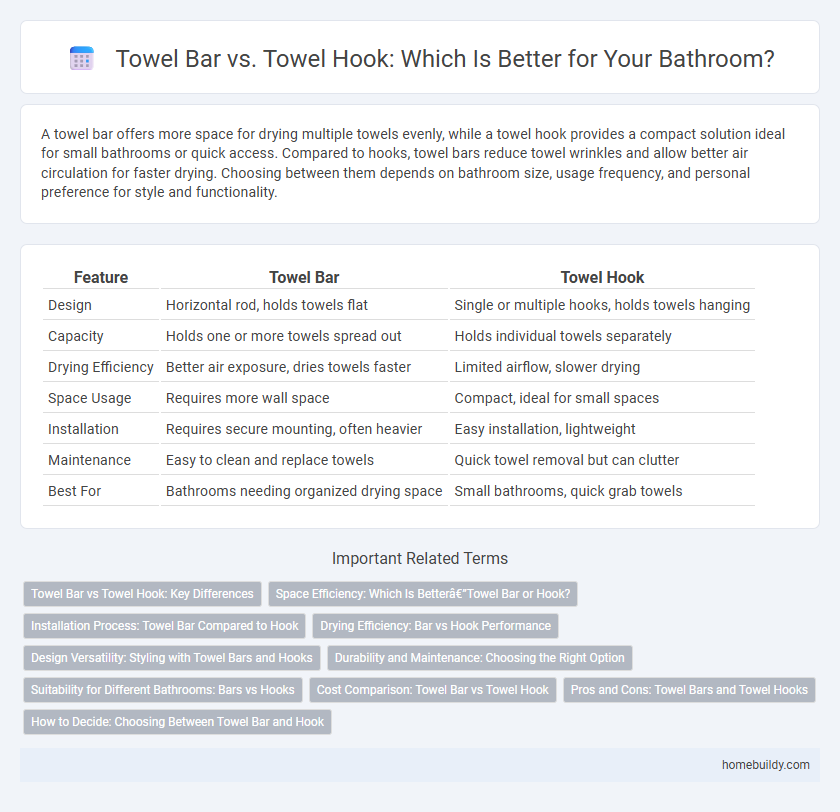A towel bar offers more space for drying multiple towels evenly, while a towel hook provides a compact solution ideal for small bathrooms or quick access. Compared to hooks, towel bars reduce towel wrinkles and allow better air circulation for faster drying. Choosing between them depends on bathroom size, usage frequency, and personal preference for style and functionality.
Table of Comparison
| Feature | Towel Bar | Towel Hook |
|---|---|---|
| Design | Horizontal rod, holds towels flat | Single or multiple hooks, holds towels hanging |
| Capacity | Holds one or more towels spread out | Holds individual towels separately |
| Drying Efficiency | Better air exposure, dries towels faster | Limited airflow, slower drying |
| Space Usage | Requires more wall space | Compact, ideal for small spaces |
| Installation | Requires secure mounting, often heavier | Easy installation, lightweight |
| Maintenance | Easy to clean and replace towels | Quick towel removal but can clutter |
| Best For | Bathrooms needing organized drying space | Small bathrooms, quick grab towels |
Towel Bar vs Towel Hook: Key Differences
Towel bars offer a longer, horizontal space ideal for drying larger towels evenly, while towel hooks provide compact, vertical hanging suitable for smaller towels or robes. Towel bars promote better air circulation, reducing moisture buildup and mildew risk, compared to hooks where towels may lie folded and retain dampness. Installation flexibility varies; towel bars require wall space and sturdy mounting, whereas hooks need minimal space and simpler attachment.
Space Efficiency: Which Is Better—Towel Bar or Hook?
Towel bars provide a larger surface area for hanging multiple towels, making them ideal for bathrooms with ample wall space but can be less space-efficient in small areas. Towel hooks excel in compact spaces by allowing vertical towel storage, saving wall space and reducing clutter. For maximizing space efficiency, towel hooks are typically better suited for small bathrooms, while towel bars offer more functionality in larger spaces.
Installation Process: Towel Bar Compared to Hook
Towel bars require wall anchors and precise measurements to ensure they are level and securely mounted, often needing two points of attachment for stability. Towel hooks offer a simpler installation process, typically requiring only a single screw or adhesive backing, making them quicker and less labor-intensive to mount. The towel bar's installation demands more tools and time but provides greater support for heavier, larger towels.
Drying Efficiency: Bar vs Hook Performance
Towel bars provide superior drying efficiency compared to towel hooks by allowing towels to hang fully extended, maximizing air circulation and reducing moisture retention. Towel hooks often cause towels to bunch up, trapping moisture and increasing drying time, which can lead to mildew growth. Choosing a towel bar enhances hygiene and extends the lifespan of towels by promoting faster, more even drying.
Design Versatility: Styling with Towel Bars and Hooks
Towel bars offer sleek, linear designs that complement modern and traditional bathroom aesthetics, allowing multiple towels to be displayed neatly and within easy reach. Towel hooks provide compact, space-saving solutions ideal for minimalist or small bathrooms, offering a casual and versatile styling option for hanging individual towels or garments. Both towel bars and hooks enhance bathroom organization while contributing distinct visual and functional elements to the overall decor.
Durability and Maintenance: Choosing the Right Option
Towel bars tend to offer greater durability due to their sturdy construction, often made from stainless steel or brass, which resists rust and wear over time. They require minimal maintenance, as their smooth surface can be easily wiped clean, preventing the buildup of moisture and mildew. In contrast, towel hooks, while convenient, may be less durable if made from cheaper materials and often require more frequent cleaning to avoid corrosion and maintain hygiene.
Suitability for Different Bathrooms: Bars vs Hooks
Towel bars provide ample space for drying multiple towels and are ideal for larger bathrooms or shared spaces, ensuring towels remain stretched and dry efficiently. Towel hooks suit smaller or compact bathrooms by saving wall space while offering quick, easy access to individual towels. Choosing between bars and hooks depends on bathroom size, user needs, and drying efficiency preferences.
Cost Comparison: Towel Bar vs Towel Hook
Towel bars generally cost more than towel hooks due to their larger size and more complex installation requirements. On average, towel bars range from $15 to $50, while towel hooks typically cost between $5 and $20. The difference in price reflects not only the materials but also the hardware and labor needed to secure towel bars firmly to walls.
Pros and Cons: Towel Bars and Towel Hooks
Towel bars provide ample space for towels to hang flat, promoting faster drying and reducing mildew growth, but they require more wall space and sturdier installation. Towel hooks save space and are easier to install, making them ideal for small bathrooms, yet towels may dry slower and can become wrinkled or bunched. Choosing between towel bars and hooks depends on bathroom size, drying efficiency preferences, and installation complexity.
How to Decide: Choosing Between Towel Bar and Hook
Choosing between a towel bar and a towel hook depends on bathroom space, drying efficiency, and aesthetic preference. Towel bars provide ample room for towels to hang flat, promoting faster drying and reducing mildew, while towel hooks save space and accommodate multiple towels in compact areas. Consider towel size, user habits, and bathroom layout to select the most functional and visually appealing option.
Towel bar vs Towel hook Infographic

 homebuildy.com
homebuildy.com